” There is no trifling with nature; it is always true, grave, and severe; it is always right, and the mistakes and errors are always those of man.” [Goethe]
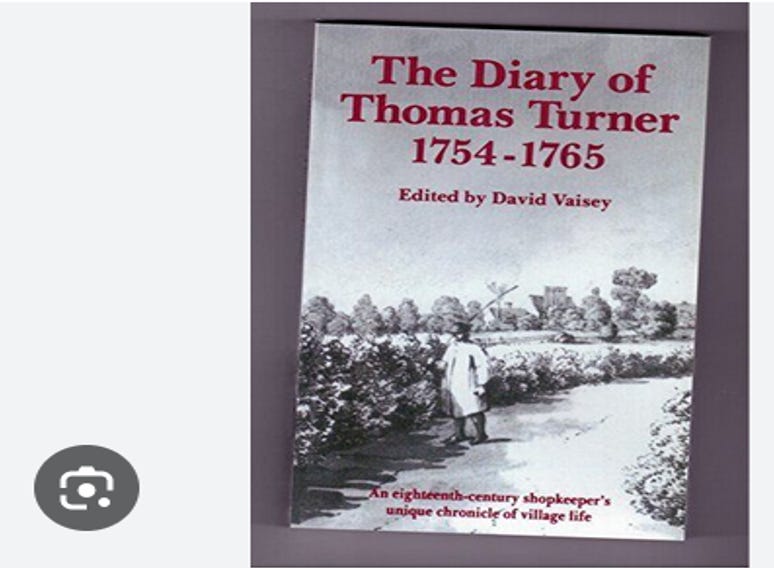
THE DIARY of THOMAS TURNER 1754- 65 (Appendix C) – [he was an accountant after my own heart.] Here are Thomas Turner’s financial dealings. THOMAS TURNER was one of the few people in East Hoathly (a village in Sussex, England) who thoroughly understood financial matters and how to draw up accounts. He spent his evenings making sure that the daily record of transactions in his shop was transferred item-by-item into the journal which he then transferred into his ledger, showing the state of each customer’s account with him.
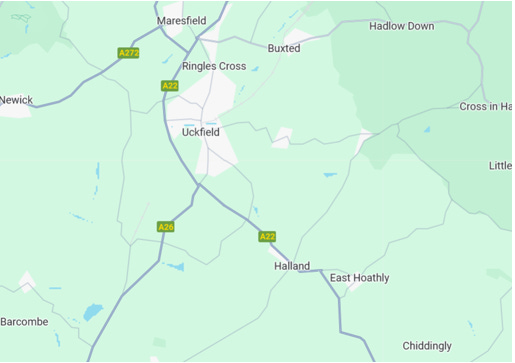
If a shopkeeper or farmer failed in business, it was as often as not, that Turner would be called to make an inventory and to act as an accountant at any subsequent sale. He was trusted to distribute charity monies and to transmit money collected upon charitable briefs; year after year his skills in casting up accounts were required by those who served the parish office of ‘Overseer of the Poor,’ involving as it did, the collection of the local ‘Poor Rate’ and its disbursement to a large number of paupers.
He was either a churchwarden or Overseer in the years 1756-7, 1757-8, 1762-3, 1763-4, 1764-5, and 1765-6 (indeed in 1764-5 he was churchwarden, Overseer, and ‘Surveyor of the Highways’ all at the same time, and is the only surviving eighteenth-century Overseer’s account book for the parish, which covers the period from 1762-79 and is entirely in his hand.
Aside from his skills in accounting Turner also fulfilled another important role in the local community in East Hoathly. He traded in an age when an adequate supply of legal tender coin could not always be taken for granted, and when there was no network of banks (beyond the central level), when money could be transferred from place to place by banker’s cheque.
His shop (a general store) was the point at which a large number of customers, and a very wide spread of suppliers (from as far away as Manchester), came together, and as such it played a key part in the transfer of cash and credit. There were four ways in which goods were bought and sold, debts settled, and paid in those days:
- By barter,
- By cash including, as yet the uncommon banknote,
- By Promissory Note of Hand, and
- By Bill of Exchange.
The diary shows all four of these methods in operation. Barter was common in the community at large, and even in the commercial world, it was frequently used. Turner often paid his servants, not in cash, but in goods: this was the case for instance with the devoted Mary Martin whose yearly salary was paid in goods on July 11, 1755. He exchanged goods for butter with Mrs. French on January 21, 1760, and then used the butter, as an account with Thomas Scrase of Lewes on the same day shows, to barter for wigs for himself and his brother.
But perhaps the commonest form of direct barter was of rags for paper making: having collected up rags in the neighbourhood, Turner packed them and sent them off to the paper mills at Hawkhurst, and Loose in Kent or elsewhere, taking finished paper and a cash adjustment in exchange.
At a lower level some paid their parish rates in kind: Mrs. Elizabeth Browne, for example, settled hers on one occasion, not in cash, but by supplying a coffin for a pauper’s funeral; and the parish occasionally acted similarly; for instance, when Thomas German’s fee of 7s. 6d. for keeping the church clock wound up was settled by giving him a hat.
Turner often complained of the lack of money in the area, but this was usually an exasperated comment on his inability to get his customers to pay their debts, rather than a reflection on the lack of coin. The diary does not indicate any permanent shortage of hard cash in the locality, and though there were occasions when, in an emergency, Turner had to borrow ready money from the Revd. Thomas Porter, Mrs. Atkins, Dr. Snelling, and others, he was normally able to pay and receive cash for all small (and for some very large) transactions, and so were his customers and friends.
At times he had great sums of money in the house and was worried by it: on New Year’s Day 1763, for instance, he got Samuel Jenner to stay with him overnight to help him guard it. This was when he was about to send the accumulated tax contributions from the parish to the Receiver at Maresfield. These sums were large: £76 in 1763, when Jenner carried the money there; over £110 when he went himself in May 1764; over £121 when Thomas Durrant took it in June 1761.
It made the carrier feel very vulnerable on the road. Banknotes were few and far between and had only a local circulation because of the difficulty of cashing, say, a Lewes banknote in Liverpool, and also, since they were payable to the bearer, there was always the danger of theft.
Nevertheless, banknotes occasionally came Turner’s way: The Revd. Thomas Porter, for instance, gave him one along with some cash as his contribution towards repairing the church in April 1763. The risks involved in dealing in coins however were greater than that of straight theft. As the diary shows there was a great variety of coins in circulation.
Besides the guineas, half-guineas, crowns, half-crowns, shillings, sixpences, and pence, there were coins of foreign origin: double pistoles also known as doubloons, and pistoles (generally agreed to be worth 36s. and 18s. respectively), half pistoles (9s.), moidores (27s.), pieces of eight (4s.6d.) and others.
On 8 April 1765 Turner accepted ‘a broad piece of gold’ from Sarah Prall which he valued by weight at 18s. though he lent her only 14s. on its security. In that transaction, Turner showed the importance of a coin’s weight, for coins could be clipped and therefore lose their value and be refused.
He normally equipped his messenger with some spare coins should any be refused by the Receiver of the Land Tax (three gold guineas in May 1760, eight guineas and one-half guinea in June 1761); and on one occasion, on 30 July 1762, one of his guineas was rejected by William Margesson in Southwark, ‘it being not weight’.
At other times Turner accumulated too much cash in the way of business: then he would parcel it up and despatch it either to one of his local suppliers, such as Samuel Durrant in Lewes (to whom, for instance, he sent £26 via the postman, John Streeter, in May 1758), William Margesson in Southwark, or John Madgwick in Lewes. It was to Madgwick that on 27 July 1760, he gave £70 in cash in exchange for a far less vulnerable means by a Bill of Exchange drawn on a third party and payable at a fixed date.
Though cash along with barter was the normal means of exchange between Turner and those who used his shop or paid their taxes and rates, the commonest means of payment between traders was the Bill of Exchange which had great advantages over both cash and local banknotes. It was payable to a particular named person and therefore no great harm could ensue if it were lost; it was backed by commodities and not by cash alone and was therefore felt to be more secure than a local banknote; it was safe, and, in many cases, an increasing asset; and it could always be exchanged by a central banker or another trader for cash (at discount) should cash be needed before the bill became due.
The workings of the Bill system in Turner’s time have been clearly explained by T. S. Ashton and by T. S. Willan in their studies of two contemporary north-country tradesmen: Peter Stubs of Warrington and Abraham Dent of Kirkby Stephen.
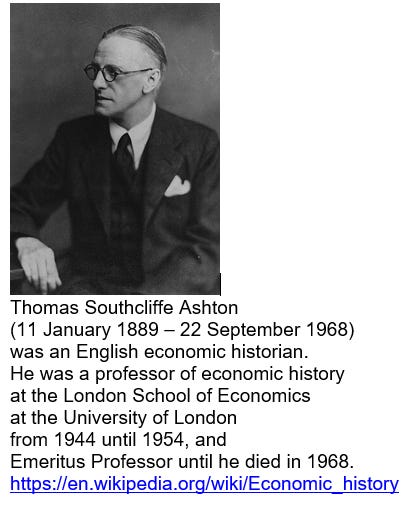
A simple example of its operation can be seen on May 11, 1756. Turner met in Lewes, one Stephen Fletcher, travelling salesman for Samuel Ridings of Manchester, a supplier of haberdashery to Turner. Turner’s account with Ridings was in debit £14 19s. Od., and to settle it he drew a bill for that amount on the Southwark merchants, Margesson and Collison, payable at some date in the future, probably thirty days later.
Margesson and Collison, who knew Turner well and respected his credit, would redeem the bill for cash on the due date. Ridings could in the meantime use the bill either to settle one of his debts, simply by endorsing it to his creditor or to raise cash by selling it at something less than its face value (this process is called ‘discounting’) to a banker or anyone who would give him cash for it.
In reverse it can be seen on July 15, 1756: Richard Waite had settled an account with George Kemp by drawing a Bill on Turner (with whom he was presumably in credit). Turner sent Kemp the necessary cash and expected to receive the bill through the post for cancellation.
Another slightly different, example occurs on 17 and 18 January 1755. Thomas Diplock needed to pay his landlord but did not wish to send cash. He therefore gave Turner the cash; Turner paid the cash, along with his other payments, to John Collison who happened to be in the area at the time, then drew a bill on Margesson and Collison payable to Diplock. Diplock presumably endorsed it and sent it to his landlord.
Again, on 23 September 1760, Turner and his brother Moses, having bought up wool from the local farmers, sold it to Thomas Friend in Lewes; Friend paid them with a Bill which had been drawn by someone in Warminster, Wiltshire, on a merchant in Basinghall Street, London, payable to Friend. Friend endorsed it to Turner who presumably gave Moses cash for his part and sent the bill to Margesson and Collison for them to redeem and to credit his account.
At times Turner is seen discounting bills, as on 5 January 1765. when he charged John Russell 2s. 6d. for cashing a bill on a London timber merchant worth £24 17s. 10d. (which he transcribed verbatim and then used to pay his account with Robert Plumer, the Lewes grocer); and at other times, for example in June 1762, he used a bill instead of cash to pay the parish’s land tax quota.
The system is fully seen on Turner’s trip to London in March 1759. Small sums he paid in cash but the larger accounts were settled by bills drawn on Margesson and Collison, while he paid into his account there was a £20 banknote and a large bill of £130 drawn on Sir Joseph Hankey and Partners by the Lewes merchant Samuel Durrant, for which on the previous Saturday Turner had paid partly in cash and partly by giving an interest-bearing Promissory Note.
By acting as clearinghouses for bills certain merchants were performing all the functions of bankers. Margesson and Collison were Turner’s London ‘bankers’, and Samuel Durrant of Lewes was his local Sussex ‘banker’. In this way, the foundations of modem banking were laid.
This whole system of course depended on mutual respect and trust amongst traders. Occasionally, for one reason or another, this trust broke down and things could be serious for the tradesman left holding the bills.
This nearly happened to Turner in February 1765, when having redeemed at a discount a Bill to the value of over one hundred pounds drawn by the apothecary Richard Stone on various tradesmen in London, Turner found that one of the tradesmen refused to pay-presumably because he was not satisfied as to Stone’s creditworthiness. This happened twice, but, after fearing that he might lose his money, Turner pursued Stone and recovered the debt from him in cash.
Most of Turner’s business was done on credit; almost all his customers ran up debts with him, to be paid when harvest came, or when the sums could be bartered away, and most of these debts were unsecured.
Occasionally Turner would accept a Note of Hand promise to pay (sometimes with interest) at a future date or on demand but not guaranteed by a third party; and once, in the case of his cousin Charles Hill, he insisted that a bond at 5% interest should be substituted for two of his Notes of Hand.
But for the most part, it was up to Turner to collect the money due to him by his customers and it was a task that he did not much enjoy. Often he would have to wait to settle at one of the many local fairs where traders met one another; and many fruitless days were spent travelling from customer to customer, failing to get in what was due to him, and he chided himself for having been too indulgent when a book debt of £40 was likely to be lost in February 1764.
A year earlier, on 25 February 1763, he complained that “I am so confined with … some large debtors in my parish that I hardly know which way to act or extricate myself out of so great a dilemma”. In the absence of any of Turner’s ledgers it is not always easy to see how long he allowed debts to remain, but Thomas Darby, for instance, who ran into financial difficulties in 1758 had been allowed to run up a debt amounting to £17 or £18 over four years.
The thought of pursuing an old acquaintance into the courts filled Turner with guilt and made him wish “that I lived in solitude and had not the occasion to act in trade”; so he put the matter into the hands of a Lewes attorney and eventually took a £22 bond from Darby backed by a Bill of Sale on his chattels.
Nevertheless, he was still trying to be paid £16 balance four years later, and hesitating over the idea of putting the Bill of Sale into execution. His suppliers on the other hand regularly visited him to settle accounts, usually staying the night with him if they came from any distance. John Collison of Margesson and Collison was often in East Hoathly.
Richard Sterry, the London oilman, stayed overnight on 30 July 1762, and riders from other suppliers called when they were in the area. Those from the more immediate locality were, like John Madgwick of Lewes, or Thomas Tipper, the Newhaven brewer, numbered amongst Turner’s good friends, and settling with them was part of their normal social intercourse. The suppliers whom Turner visited on his trip to London in March 1759 can, for the most part, be identified from contemporary directories as follows:
- Mr. John Albiston-Barlow and Wigginton
- Mr. James Blake
- Mr. Calverley and Son
- Mr. Corderoy
- Mr. John Crouch
- Mrs. Crowley and Co.
- Cruttenden and Burgess
- John Albiston, tobacconist, Friday Street.
- Barlow, Wigginton & Francis, linen-drapers, Gracechurch Street.
- James Blake, linen-draper, Gracechurch Street.
- Calverley and Sons, druggists, Borough, Southwark.
- John Corderoy, Horse-millener, Upper Thames Street.
- John Crouch, grocer, Borough, Southwark.
- Theodosia Crowley & Co., Ironmongers, 151 Upper Thames Street.
- Cruttenden & Burgess, hosiers, Borough, Southwark.
[For London directories of this period see C. W. F. Goss, The London Directories, 1677-1855 (1932).]
GEOPOLITICS – THE END TIMES?


In 98AD St. John said: “Young children, it is the last hour, and, just as you have heard that antichrist is coming, even now there have come to be many antichrists; from which fact we gain the knowledge that it is the last hour.” [1 John 2:18]. According to John’s first letter, and Paul’s second letter to the Thessalonians, what do these symbolic weeds represent? The harvest is now happening during the ‘conclusion of a system of things,’ the symbolic weeds make up the foretold antichrist.
In his prophecies on the conclusion of the system of things, Jesus warned his followers: “Look out that nobody misleads you; for many will come based on my name, saying, ‘I am the Christ,’ and will mislead many.”
P. Dutton has just published a startling book by Annie Jacobsen titled Nuclear War: A Scenario. The “scenario,” as she describes it in an Author’s Note, begins with a nuclear strike on the Pentagon, a “Bolt out of the Blue” that the U.S. Nuclear Command and Control System (NCCS) calls an “un-warned large [nuclear] attack.” Annie Jacobsen next identifies 47 people she interviewed for the book—nuclear scientists, people who formerly held NCCS positions and different U.S. policymakers. In a Prologue to the book titled “Hell on Earth,” she writes:
“A 1-megaton [of TNT] thermonuclear weapon detonation begins with a flash of light and heat so tremendous it is impossible for the human mind to comprehend. It’s 180 million degrees Fahrenheit, is four or five times hotter than the temperature at the centre of the Earth’s sun…”
The searing light superheats the surrounding air to millions of degrees, creating a massive fireball that expands at hundreds of miles per hour. Within a few seconds, the fireball increases to a diameter of little more than a mile (5,700 feet across), its light and heat are so intense that concrete surfaces explode, metal objects melt or evaporate, stones shatter, humans instantaneously convert into combusting carbon.” Sources
- At no point since the first atomic bomb was dropped on Hiroshima on August 6th, 1945, has humanity been closer to the unthinkable – a nuclear holocaust that could potentially spread in terms of radioactive fallout and nuclear winter https://www.globalresearch.ca/exposing-nuclear-war-propaganda-dangers-safe-use-nuclear-weapons/5853796
- Facing Nuclear War – https://www.lewrockwell.com/2024/04/donald-w-miller-jr-md/facing-nuclear-war/
- Ukraine’s Starting to Get Dangerous https://www.theburningplatform.com/2024/04/04/ukraines-starting-to-get-dangerous/
The whole planet awaits with bated breath the inevitable Iranian response to the attack against its consulate/ambassador residence in Damascus by the biblical psychopaths responsible for the Gaza genocide https://www.unz.com/pescobar/russia-and-china-sketch-the-future-as-the-world-awaits-irans-next-move/?utm_source=email&utm_campaign=pescobar
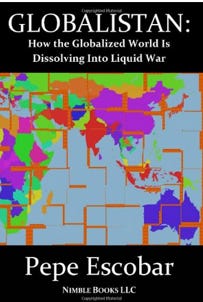
BOOK RECOMMENDATION
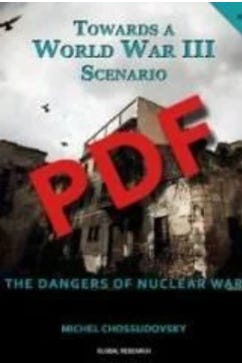
FINALLY – A THOUGHT
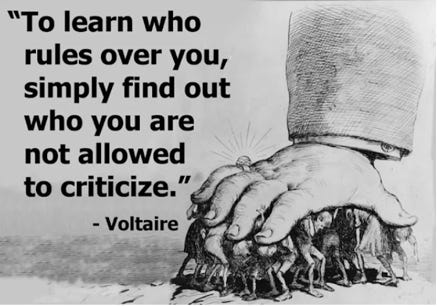
ALERT: the ‘LGBT Agenda’ Threatens My Christian Beliefs: The clash between my Christian rights and the LGBT agenda has reached a tipping point. All Christians might sign this petition and ensure the world knows that we stand united against the LGBT agenda promoted by the United Nations. https://citizengo.org/en-gb/rf/211534-Alert–the-LGBT-agenda-threatens-Our-Christian-Beliefs?utm_medium=shared&utm_campaign=EN-GB-Welcome-Pack.WP_06_AA_Best_Evergreen_HF_RL_Retargeting&utm_source=link&_ref=
COMING NEXT
- BOOM’s Global Weekly Review – Tuesday, April 16, 2024
- Letter from South Africa – BOERS & BLOOD – Saturday, April 20, 2024
REFERENCES
- My Book: “The Financial Jigsaw” Parts 1 & 2 Scroll: https://www.researchgate.net/publication/358117070_THE_FINANCIAL_JIGSAW_-_PART_1_-_4th_Edition_2020 including regular updates.
- BOOM Finance and Economics Substack (Subscribe for Free) – also on LinkedIn and WordPress. Covid Medical News Network CMN News BOOM Blog — All Editorials (over 5 years) — BOOM Finance and Economics | Designed for Critical Thinkers — UPDATED WEEKLY (wordpress.com)








The Dims want rates lowered but the US Fed wants an economic crash and chaos to implement their retail CBDCs (FedCoins and an Individual Identity QR code, ref Rev 13:16,17). The jews do not believe the NT, esp Rev (nor Is 53 or Zec 12,13,14). Trump said he will never allow retail CBDCs so if they can’t get rid of him with phony charges, biased judges and Jurys, he could become JFK’d. He should fire any Secret Service Agents, and increase his own security. I think the US, Germany and Russia all just sent high officials to China because it’s about SHTF O’Clock with the dollar’s value, US Trade, EU & US ZOGs Tyranny, UNazis, and IDF Genocides. Sort of like the Nazis in 1944 knowing D-Day was coming for them; and have a Happy 5Nov2024 Dims.
Yes indeed rhs jr – the Nazis never went away and BOOM is convinced they are among us today. https://www.naturalnews.com/2022-02-18-the-nazis-werent-defeated-they-went-underground-and-now-run-canada-and-the-world.html
I met some Nazis in their 30s or so; clean cut and sharp. They are also working for Chaos. However, I think the dual passport Bolsheviks run the Fed and America; they stupidly repudiate the NT. Both fascist serve Satan and although the Bible is not infallible, the NT is a box of Gems that paints a pretty clear outline of the future. I don’t see how anybody can read Is 53 and Zech 12-14 and blow off Jesus, esp with all the modern credible Prophets & NDE stories from credible people. Jews will destroy the West & find out the hard way.
Thanks rhs jr – our faith will prevail but the tribulation of seven years must happen first according to the prophets.
April 13, 2024
A historic date to remember 🙂
A Pay Back Day like 6Jun1944 D-Day, also reminds me of the fall of Berlin, Hiroshima, JWB shooting Lincoln, Timothy McVeigh blowing up fertilizer in front of the Murrah Bldg, the Treaty of Versailles. Bibi is bragging that the IDF got 99% of the incoming missiles but the Russians and Iranians learned in Ukraine that each $10,000 drone took out a $10,000,000 interceptor missile (estimates). A few more such pyrrhic victories and the air defense game with missiles is practically over for the IDF. No matter how big you are (Lincoln, Nazi Germany, Saddam Hussein, US Army, IDF, etc) , beware starting fights because you cannot outrun a bullet.
Yep – the Global South is winning big time.